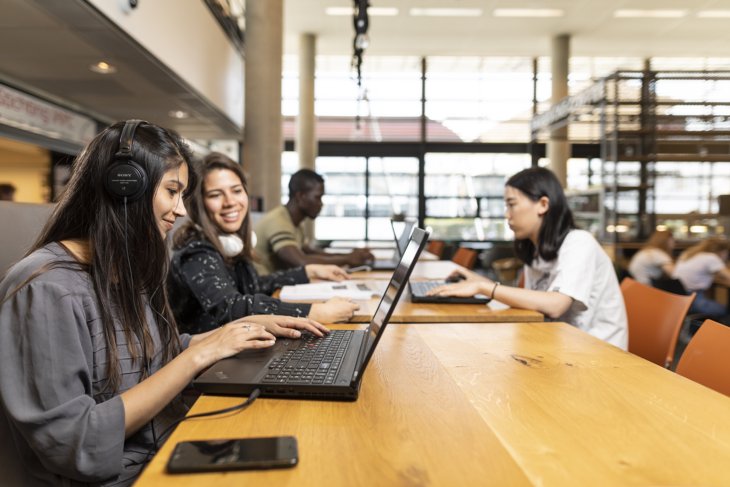The most important thing to get back to your study routine is to maintain a positive mindset, which sounds cliché, I’ll admit, but many people underestimate the benefits of being hopeful. Whether you’re a new student at the University of Twente or returning for another year, it’s important to remember why you’re studying in the first place. Read on for seven tips to get started.
1. Create a schedule
I’ve personally never stuck to schedules, but I’ve found them helpful for other reasons: just writing out the things you need to do, on pen and paper, makes those things seem more concrete. However, creating a schedule and sticking to it is also a good idea: begin by noting down your course materials, week by week, including the exams and projects. Make sure you’re allocating enough time to get some actual studying done (at least two hours every day for non-test days) while also getting enough time to spend on your leisurely activities. You could also use this opportunity to try out something new – if you usually study at night, maybe try studying during breaks throughout the day before you go home from campus.
You don’t have to stick to your schedule for the entirety of the year. I tried it and failed miserably. I’d tell myself to study this one subject for only an hour and a half and boom, three hours later it’s already 11 P.M. and I’m too tired to even look at my schedule again. It did, however, force me into a routine I eventually grew comfortable with. Start with a flexible schedule, and as the year progresses, things will naturally fall into place.
2. Define your priorities
Everyone has something different going for them, which means priorities are also different. Throughout the summer, I enjoyed staying up late and sleeping in, which is a no-go for university. One of my priorities will be to get my sleeping schedule back on track.
The point is, define what your priorities should be to get back to the studying mindset. A good place to start is the obvious: food, exercise, and sleep. Make sure you have enough food for at least a week at all times to minimise your trips to the store, make sure you’re exercising every day in some way, and please make sure you’re getting enough sleep. Studying for 40 hours a week is all fine and dandy, but a lot of good it’ll do to you if your body can’t physically function.
Other priorities can be to set up a designated studying/working area, or to install a specific program for a course. So long as your priorities are met, you have nothing else left but to study and get by, so defining your priorities and completing them makes it much easier for future you. Start small, and then go on to the bigger things on your priority list.
3. Clean up
Your living space can become a bit of a mess during the summer. I find it extremely hard to study and focus in the middle of a chaotic environment, which is why I set aside a little bit of my time to clean up and make my study area as tidy as possible. If you’re a new student, you might have gotten away with a messy room during high school, but I know from personal experience that higher education is a million times better with a nice, clean room waiting for you at the end of the day. Along with your other list of priorities, you should get started on cleaning straight away before your classes start.
4. Find new study spaces
If you’re an older student, you may have gotten bored of the usual Bastille-Vrijhof cycle. Nothing wrong with that, of course – some people just have that one spot they always go back to. Other people, however, do well in new, exciting environments, and perhaps a new study spot will do just that. For new students, studying doesn’t just have to happen in your room at your desk – maybe the library or a café will do you better. If you’re looking for inspiration, then check out our study spots article.
5. Be easy on yourself
I remind myself constantly that the start of the academic year is usually pretty chill. Not many deadlines, classes are typically easy, and no tests in the foreseeable future (though I’d double-check the schedule). I don’t go straight into exam mode from the very start – you don’t want to waste your fuel before the race even starts. Aside from classes, there’s really not much you should be worrying about in the first couple of weeks of university, which leaves you time to do other things, such as refining your schedule, socialising with friends, and doing your hobbies. It will get harder eventually, but hopefully, you will have grown used to the rhythm of university by that time.
Of course, this doesn’t mean to slack off and only show up to classes. You should be studying. Being easy on yourself means not getting caught up in the small details and not worrying about things in the distant future. Take things slowly, at least during the beginning, one step at a time. If you’re a new student, then this is obviously all new to you: take your time! If you’re a returning student, then you know how it goes.
6. Pay attention
Once you’ve started classes, you’ll be surprised how many people detune out of the lecture and start scrolling on their phones. Don’t be one of them – pay attention to your professor. One of the easiest things to do to stay on top of your studies is to just pay attention during your lectures and take notes. You don’t have to be the most active student ever, and you definitely don’t need to raise your hand to ask questions every time the professor pauses. Just show up, pay attention to the slides, retain the information, and review it once the lecture is over in your own time. It’ll make exam week way less stressful once it arrives, as you know all the information and you just need to practise.
7. Reward yourself systematically
Most people have a reason for why they’re doing something. You’ve probably heard of the ‘give yourself chocolate’ tip after you’ve finished an exercise. This is exactly that – though, it doesn’t have to just be chocolate. Work and study hard until you’re satisfied enough that you don’t feel guilty about going out with your friends on a Friday evening. You can also create a rewards system after you’ve completed specific goals, either study-related or otherwise, such as ordering food, eating out or planning a vacation. Having something to look forward to after hard work is a reward by itself and can provide that little boost you need to get through a harrowing week. Make sure you always have something to look forward to every week – you deserve it!




